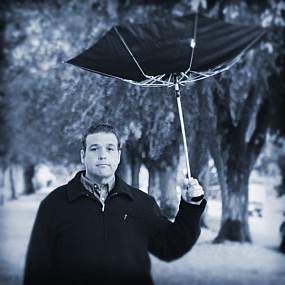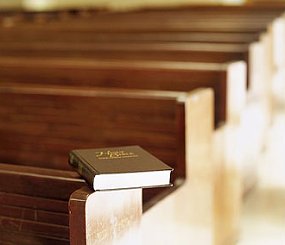
Donald Miller
Many of my Christian friends have noted Donald Miller’s recent post about rescuing the Christian Church from leadership dominated by scholars. Miller, the firebrand behind the famous (or infamous, depending on your view) Blue Like Jazz, sells his perspective hard. As always, I recommend you read the whole thing.
But is he right?
The Internet is a screwy place. If one were to view the whole of American Christendom by what one reads on the Internet, Miller’s contention might seem accurate. What’s written on the Internet does skew toward academic discussions, and yes, people fight like cats and dogs over doctrines (both macro and micro) on Web sites of all sizes.
But the Internet is skewed toward odd demographic leanings, and as a result, I don’t believe what is discussed on the Internet mirrors the discussion of the average church. Plus, those of us who write about church-related issues should not believe our own press. Fact is, the average Christian could care less about the Godblogosphere.
Or their nearest Christian seminary, for that matter. “Normal” people just don’t have the wherewithal to care about the background machinations of American Christendom. They leave such ponderings for eggheads who write blogs they don’t read or brainiacs who inhabit seminary classrooms they’ll never darken.
Hey, let’s get real, OK?
By some counts, we have 300,000 churches in the United States. In my wanderings through the Church over the course of 35 years, I’ve met perhaps two dozen people I would deem genuine scholars, and not a single one of them was running a church. I’m not sure from where Miller is getting his academic oligarchy, but if even a tenth of those 300,000 churches are pastored by someone who can translate a chapter of John from Greek to English, I’ll volunteer to shine Miller’s shoes for a year.
So much for the scholars. If anything, churches are hurting for a good scholar or two, leaders or laymen. I once attended a church that had a genuine scholar in its midst, and the church leaders would trot him out from time to time to give his academic imprimatur on some supposedly weighty theological matter, and then they would usher him back into his hermetically sealed container to await his next rethawing. If anything, when true scholars do exist in our pews, we tend to treat them as something of a sideshow act. Shame on us, but there it is. In addition, some local church leaders see scholars as a threat, not as a resource. Human nature being what it is, when you’re trying to prepare a sermon on a text and you’ve got someone sitting in the seats who held that passage in Dead Sea Scroll-version in his hands and read the Hebrew right off it, well, it’s a tad unnerving to most guys who barely made it through seminary, if they even made it to seminary at all.
Teachers are another issue, though. And on this, Miller may have a bit of a point. But, as we’ll see, only a bit, because perception and reality are not the same thing.
We have a fundamental problem in the American Christian Church regarding roles and gifts. Somehow, and more and more books are appearing that look at this problem, we’ve developed a way of doing church that focuses all the responsibility and leadership initiative on one soul: the pastor.
Yet even a casual reading of the New Testament tears down our idolmaking for that calling. The pastor simply cannot be the focal point of all ministry within a given church. The Bible makes this clear:
Now you are the body of Christ and individually members of it. And God has appointed in the church first apostles, second prophets, third teachers, then miracles, then gifts of healing, helping, administrating, and various kinds of tongues. Are all apostles? Are all prophets? Are all teachers? Do all work miracles? Do all possess gifts of healing? Do all speak with tongues? Do all interpret?
—1 Corinthians 12:27-30
Fact is, pastor isn’t even mentioned in that passage. The closest we get is apostle, and plenty of folks out there who get all worked up about things don’t believe apostles exist anymore, so where does that leave us?
Well, back at pastor, because our societal and cultural constructs have made pastor the be all and end all of ministry.
I’ve talked to many pastors over the years. Most of them didn’t receive a call to teach others. Most received a calling to help the Church and the people in it however best they could with whatever gifts they had. Though Miller would have us believe that church leadership at the local level is crawling with teachers, it’s really only crawling with those people who have had teaching thrust upon them. And that’s a massive distinction.
For years George Barna has polled the American Church to get a sense of where we’re at. A few years back, he polled pastors and asked them how well they thought they were teaching their charges. The mutual pastoral backslapping commenced, as pastors uniformly believed they were doing a great job teaching. But when Barna polled the congregations of those same pastors, ignorance of even basic doctrine was rampant. The disconnect was startling.
And why shouldn’t it be when we keep expecting pastors to be the primary teachers in a church? They simply aren’t in most cases. They weren’t trained to teach, don’t know how to teach well, and were cast into the role of teacher with the facts, but not the skills.
Scratch the surface of the average church pastor, and you are most likely to find someone who excels at creating vision, connecting to people relationally, or has gifts for administration and management. Some are gifted teachers, but not most, yet they are expected to teach at all times.
Miller is wrong if he believes that scholars and teachers are leading the Church for the simple reasons that genuine scholars are rarities (and even rarer in leadership within a local church) and the average teaching pastor has been ill-equipped to teach. Tossing labels around is one thing, but let’s be honest about the true state of the Church.
The better question is whether we value teaching too highly. I don’t believe that can ever be the case. Barna’s polling not only revealed the overconfidence of pastors in their teaching, but it also exposed the general ignorance about the Faith that wreaks havoc everywhere ignorant Christians go. People ARE destroyed for lack of knowledge. Christians who don’t know what they believe cannot transmit what they believe to others who do not understand. End of argument.
So, where is the balance in all this?
Ideally, the Church should…
Teach its people the Faith.
Encourage the giftings of each person within the local church for service to that church and the greater whole of Christendom.
We’re not doing either of those well.
If you’ve read me long enough, you know I have a beef about our lack of a cradle-to-grave educational plan in our churches. We must have one. Each church must determine theirs.
AND we need to identify the gifts and talents of people in the seats so that they are released to minister as God would have them. Sadly, the “pastor as church emperor” stifles that potential. If anything, the pastoral role should be just one of several. Many pastors don’t preach well. Then who is the best preacher in the church? Many pastors are less-than-ideal comforters of the bereaved and hurting. Then who are the best comforters? Many pastors don’t listen well, either to their people or to the Lord. Then who are the best listeners and the best prophets? Many pastors don’t teach well. Then who does? Let’s get the right people in the right roles and start doing this right. And if that means the pastor reads the Scriptures on Sunday and someone else preaches or teaches, then fine. If that means that no one is paid staff, then fine. If that means the staff is huge and paid, fine. If that means that the whole church lives in one large apartment complex and does a kibbutz-type thing, fine. But let’s stop whatever we’re doing with the current model because it just doesn’t work all that well.
In short, does the Church function as a body with Christ as the head or with the pastor as the head? We know the answer. Now what are we doing to rethink how we do church so that everyone in the church is operating in their genuine giftings and receives the honor due them?
Ultimately, this is what Miller is aiming for. Taking a potshot at scholars and teachers isn’t the way to get there, though. We know the Church is a body, so let’s stop shooting that body in the foot.
 I note the fact that I have visited these people’s homes because it says something about who they are. Sure, I’ve visited the homes of a few others who are still around, but the disproportionate number of leavers still says something about who those people were to me: my best church friends.
I note the fact that I have visited these people’s homes because it says something about who they are. Sure, I’ve visited the homes of a few others who are still around, but the disproportionate number of leavers still says something about who those people were to me: my best church friends.

 No one else is needed to listen to that leading and help make sense of it. We’re Americans, so why should we need anyone else’s help to understand how to live our lives according to the leading of he Spirit?
No one else is needed to listen to that leading and help make sense of it. We’re Americans, so why should we need anyone else’s help to understand how to live our lives according to the leading of he Spirit?